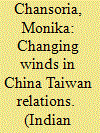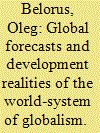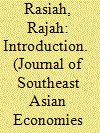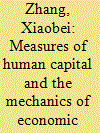| Srl | Item |
| 1 |
ID:
086219


|
|
|
|
|
| Publication |
2009.
|
| Summary/Abstract |
The landslide victory of Kuomintang (KMT) Party candidate Ma Ying-Jeou in Taiwan's presidential poll in 2008 seems to have triggered a new wave in Chian-Taiwan ties, a possible precursor to economic prosperity, political stability, social harmony, and peace in the Taiwan Strait.
|
|
|
|
|
|
|
|
|
|
|
|
|
|
|
|
| 2 |
ID:
129637


|
|
|
|
|
| Publication |
2014.
|
| Summary/Abstract |
The global financial crisis (GFC) and subsequent Eurozone sovereign debt crisis (ESDC) have made reform of the global financial governance regime a priority for governments around the world. Prior to the crisis, neoliberal policies agreed between the European Union and the USA created a financial governance regime based on the principle of free operation of the market through the norms of market self-regulation, equal access to the market, and stability via institutional supervision. How will global financial governance look like after these crises? And what role can the EU and China play in shaping this regime? This article argues that as a result of the GFC and the ESDC, stability is becoming a second principle of global financial governance, along with the free operation of the market. Meanwhile, European and Chinese views regarding the norms, rules, and decision-making procedures designed to implement those principles do not differ as much as they used to. Thanks to interactions at the bilateral and multilateral levels, the EU and China now have knowledge regarding how the other understands the role and characteristics that financial governance should have. This is leading to convergence in some areas and cooperation in others. Concurrently, there are also areas of competition. Analysing all of these is essential to understand how global financial governance might evolve, given the central role that the EU and China now play in this regime.
|
|
|
|
|
|
|
|
|
|
|
|
|
|
|
|
| 3 |
ID:
134114


|
|
|
|
|
| Publication |
2014.
|
| Summary/Abstract |
is shaping the destiny of every country in the world.
Today, long-term forecasts of global development for the next 25 and 50 years rely on strictly imperative norms; the "breakthrough into the future" scenarios should proceed from the actual unity of the world and take into account the transition-transformation nature of its development.
Global transformation has no end; the social and economic convergence of countries with different levels and characteristics of development is a new phenomenon that calls for in-depth political and economic study. The expert community has already concluded that recurring crises of overproduction will alternate with non-cyclical crises of overconsumption of resources, while the accompanying new technologies of social production and economic relations will become even more dynamic.
|
|
|
|
|
|
|
|
|
|
|
|
|
|
|
|
| 4 |
ID:
165379


|
|
|
| 5 |
ID:
182763


|
|
|
|
|
| Summary/Abstract |
We examine the mechanism by which human capital affects economic growth and convergence, using provincial level panel data from China. We specify alternative measures of human capital and apply them to an enhanced growth model, which we estimate parametrically, nonparametrically, and with a threshold model. Our results show that economic convergence is pronouncedly conditional on human capital across all measures. The positive “benefit of being backward” due to lower initial income is almost trumped by the negative impact of low levels of human capital in the poorest areas.
|
|
|
|
|
|
|
|
|
|
|
|
|
|
|
|